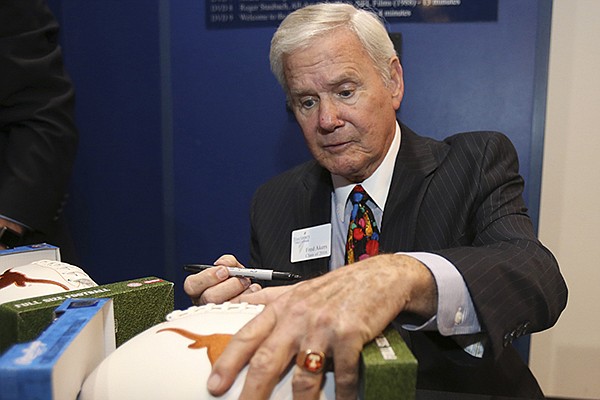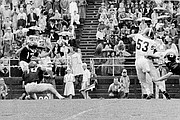Fred Akers, a former Arkansas football player who led Texas to a pair of undefeated regular seasons as a coach, died Monday, his daughter Lesli told The Associated Press.
Akers, 82, died at his home in Horseshoe Bay, Texas, from complications of dementia.
Akers followed a coaching giant at Texas and came agonizingly close to glory himself with two undefeated seasons before national title hopes ended with losses in the Cotton Bowl.
He coached the Longhorns’ first Heisman Trophy winner, Earl Campbell, and won like few others at Texas, amassing an 86-31-2 record in 10 seasons. But a bowl game rout in 1977 and a muffed punt six years later on the same field cost Akers and Texas a football national championship the Longhorns wouldn’t win for another 28 years.
Akers was an assistant on Darrell Royal’s staff when the Longhorns adopted the wishbone — an innovative scheme featuring three running backs — and won an undisputed championship in 1969. Texas followed with an undefeated regular season in 1970. Akers then left Texas to become the head coach at Wyoming for two seasons before returning to Austin after Royal retired in 1976.
Akers was long cast as an outsider by some within the Texas program because he wasn’t anointed by Royal to be his successor. Royal favored defensive coordinator Mike Campbell, but a search committee led by former Gov. Allen Shivers picked Akers and the divide split Texas fans for years.
Royal and Akers came from poor families in neighboring states — Royal from Oklahoma, Akers from Blytheville in northeast Arkansas. Akers got his first football when he was 4 years old from his father, who found it in a crumbling Air Force barracks that was being torn down. But for all the similarities in their backgrounds, their coaching styles were vastly different.
Where Royal had a folksy personality that produced enough witty one-liners to fill books, Akers was strictly buttoned-down and all business. He insisted on wearing a jacket and tie for office interviews, and brought in West Coast sports psychologists to speak to his team. He even produced three videos discussing “New Age Leadership.”
“He was always buttoned up, put together. It was about respect. He respected his position and how he represented the state, the university, the people and the players,” Lesli Akers said.
And Akers won big, for a while, by disrupting some of what Royal had built but had become stale. Other teams, notably Oklahoma, had adopted the wishbone and were beating Texas regularly with it. Changing the offense to feature the rugged Campbell in the I-formation was a smashing success.
Campbell won the Heisman Trophy in 1977 before heading off to a Hall of Fame pro career. Texas was No. 1 heading into the Cotton Bowl against Notre Dame when Akers’ brother and nephew were killed in a car crash in Arkansas a week before the game. Texas lost 38-10.
“We were the best team that year,” Akers told the Arkansas Democrat-Gazette in 1999, “but not that day.”
Texas went 10-1-1 in 1981 — its only loss 42-11 at unranked Arkansas — and finished No. 2 in the country before making another run at the national title in 1983. A muffed punt late in the fourth quarter against Georgia in the Cotton Bowl allowed the Bulldogs to pull out a 10-9 win.
Had No. 2 Texas won that game, it likely would have finished No. 1 after Miami upset top-ranked Nebraska later that night.
Texas was No. 1 in 1984 before Akers decided to kick a late field goal to tie Oklahoma rather than play for the win in driving rain. The Longhorns finished 7-4-1 and Akers was fired two seasons later.
Despite a 2-7 record in bowl games, Akers won two Southwest Conference championships and his 86 victories rank third in school history behind Royal (167) and Mack Brown (158).
"He was so kind to me," Brown, now head coach at North Carolina, tweeted Monday. "He was a great man, a wonderful football coach, and an excellent representative for the University of Texas."
After his firing at Texas, Akers spent four seasons at Purdue. He left college coaching after four straight losing seasons with the Boilermakers.
“He loved his players. He loved the University of Texas, and the University of Arkansas where he played,” Lesli Akers said. “He loved them to the end.”
Akers was a star back on great Blytheville High School teams in the 1950s and committed to play football for Jack Mitchell at Arkansas. Mitchell left Arkansas for Kansas after Akers’ sophomore season, and Frank Broyles was hired to replace him.
Broyles and Royal — who was hired at Texas one year earlier — quickly built their programs into winners. In 1959, Akers kicked a 29-yard field goal to give Arkansas a 3-0 win over TCU — a victory that ultimately tied the Razorbacks with TCU and Texas atop the final SWC standings. It was the first of three consecutive SWC championships for Arkansas.
As a sophomore in 1957, Akers missed a chip shot field goal in the closing minutes of a game against No. 1 Texas A&M in Fayetteville. With a victory the Razorbacks might have bumped the Aggies — coached by Bear Bryant — from the Cotton Bowl.
“Jack Mitchell was the coach,” Akers told the Democrat-Gazette in 1999. “I kicked for a couple of days in September practices, but Jack told me to forget it. ‘You’re a holder, not a kicker,’ he said. Our quarterbacks always held for kicks.
“Jack walked up to me on the sideline (during the Texas A&M game) and handed me the tee. All he said was, ‘Kick it,’ and I missed it.”
Akers — along with Bryant at Alabama and Barry Switzer at Oklahoma — were native Arkansans who were among the most well-known coaches in college football in the 1970s and 1980s.
Akers and Switzer were teammates at Arkansas who got their coaching starts as assistants on Broyles’ staff. They later coached against each other 10 times in the Red River series between Texas and Oklahoma. Akers beat Switzer five times and tied him another.
“Sorry to hear passing today of Fred Akers, a former college teammate and friend for over 60 years! He was a good man!” Switzer tweeted Monday.
Led by the Heisman winner Campbell, Akers’ Longhorns defeated Arkansas 13-9 in Fayetteville in 1977. It was the Razorbacks’ only loss that season as they finished third in the final polls.
Akers went 7-3 against his alma mater, but all three losses were notable.
Arkansas defeated Texas 17-14 in 1979 in Little Rock and tied Houston for the SWC title, one game ahead of the Longhorns.
Texas’ 31-point loss in Fayetteville two years later was its most lopsided to Arkansas. The No. 1 Longhorns scored their only touchdown in the game’s closing minutes after the Razorbacks led 42-3.
In the final game involving Akers, the Razorbacks defeated the Longhorns 21-14 in 1986 for their first win in Austin in 20 years. Texas finished the season 5-6 and Akers was fired at the end of his only losing season with the Longhorns.
In 1997 Akers joined the Razorbacks’ lettermen’s club, 38 years after his playing career ended.
“They wouldn’t let me as long as I was coaching Texas,” Akers said with a laugh.
Information was contributed by Jim Vertuno of The Associated Press and the late Arkansas Democrat-Gazette sportswriter Jim Bailey


